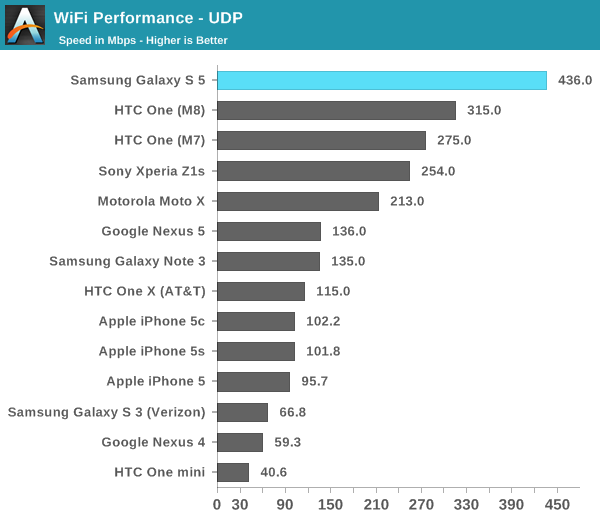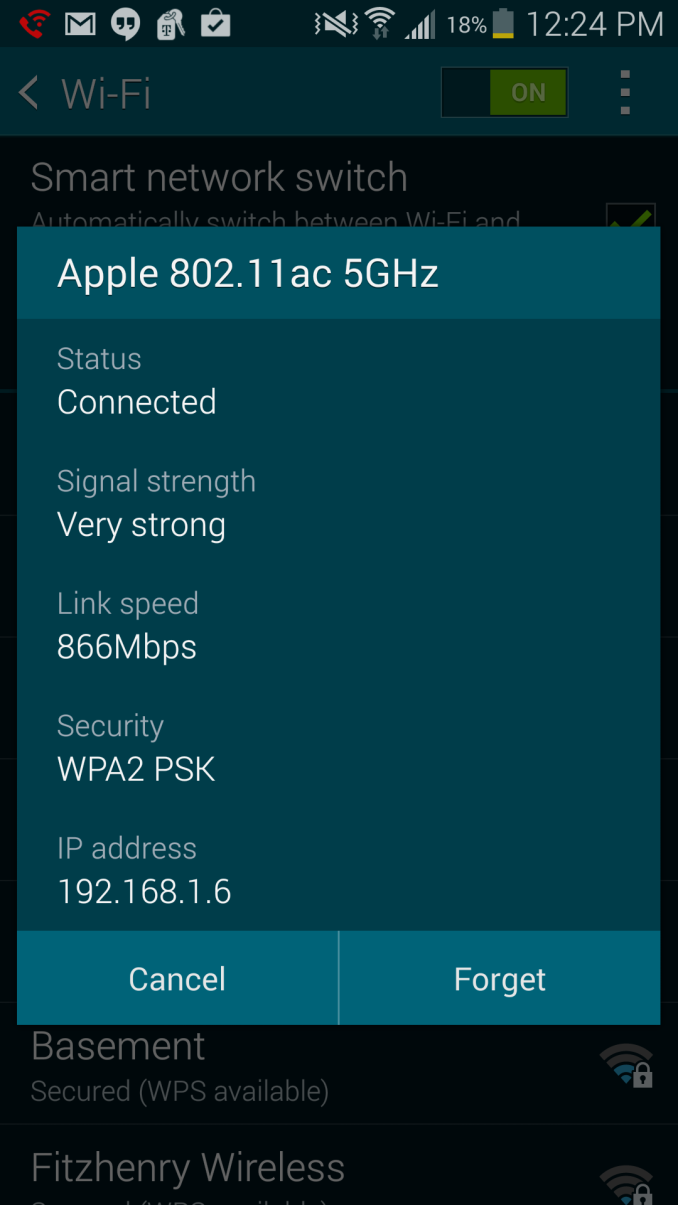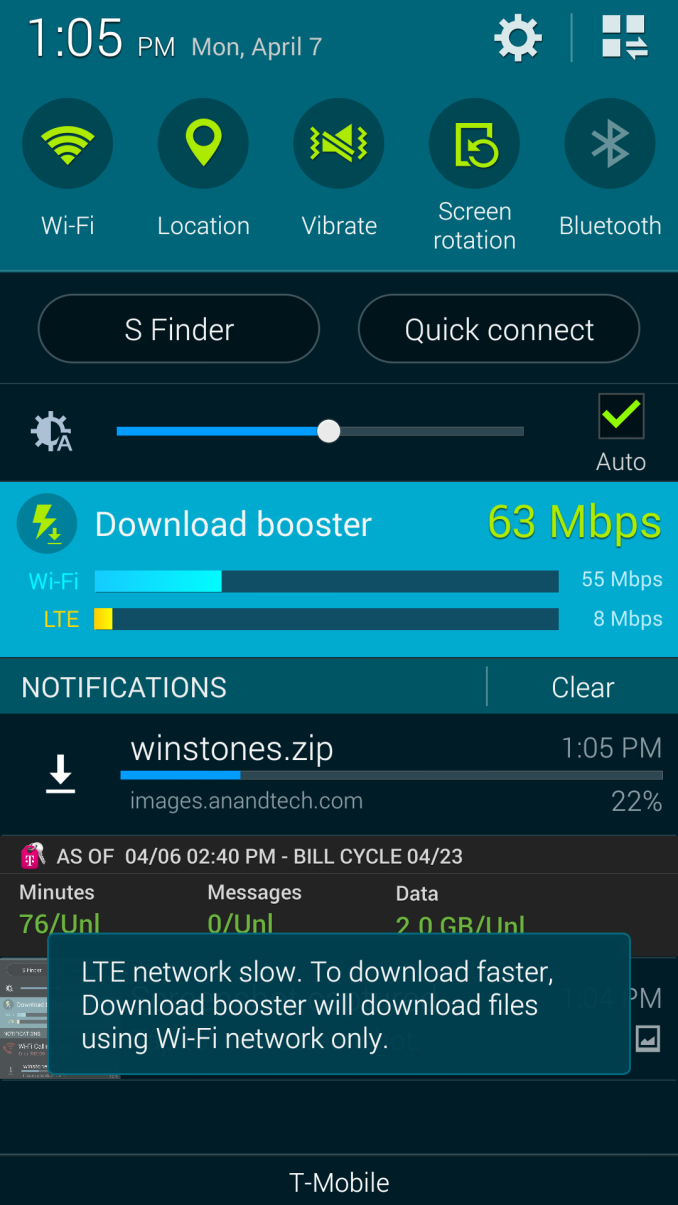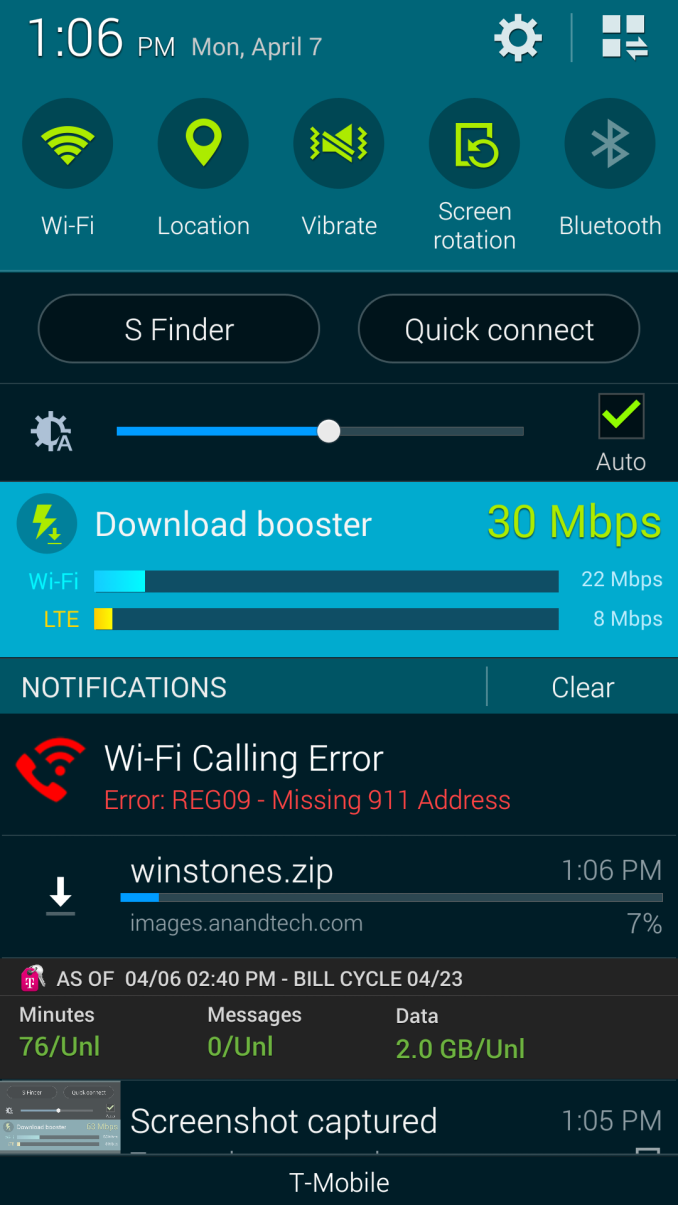Samsung Galaxy S 5 Review
by Anand Lal Shimpi & Joshua Ho on April 8, 2014 12:00 AM EST- Posted in
- Smartphones
- Samsung
- Mobile
- Galaxy S 5
WiFi, Cellular & Download Booster
At MWC this year Broadcom announced its BCM4354 802.11ac 2x2 MIMO WiFi combo chip for smartphones/tablets, which found its way into the GS5. The result is a smartphone capable of negotiating with an 802.11ac AP at 867Mbps, and transferring data at up to 436Mbps.
Although peak performance is nice, there are also power benefits to being able to transfer data quickly over WiFi (race to sleep applies to network interfaces as well).

The Snapdragon 801 features Qualcomm's integrated category 4 LTE 9x25 modem core. As I mentioned in our power analysis, Samsung also chose to include Qualcomm's QFE1100 envelope tracker (just like in the Galaxy Note 3). The GS5 is also the first flagship Samsung device to include support for 2 carrier aggregation on supported LTE networks. Samsung doesn't appear to be using Qualcomm's antenna tuner or any other RF360 components in the Galaxy S 5.
Seamless transition between network interfaces is one component of Qualcomm's vision of the future of connected devices. The problem is presently more of a software one than a hardware challenge. Samsung is beginning to explore software abstraction of underlying network interfaces with the GS5's software stack. There's now an option to prevent transitioning to WiFi networks that don't offer an improved network experience compared to your broadband connection. I haven't had a ton of time to test this feature out yet but it's something I plan on messing with more over the coming weeks.
The other big feature is what Samsung is calling Download booster. If enabled and under the right conditions, download booster allows you to combine WiFi and cellular network interfaces to accelerate large file downloads. All you have to do is enable download booster and you'll get a notification if it's active and working:
Download booster uses HTTP range requests to divide up files between the two network links. The feature can migrate data sessions from one link to another (WiFi to LTE, LTE to WiFi). Supported apps include the Play Store, YouTube, Facebook photo/video downloads, Samsung apps and standard HTTP web browsing (both Samsung's own browser and third party browsers). FTP and UDP aren't supported, nor is HTTPS.
There are other limitations as well. File downloads smaller than 30MB won't trigger download booster. Similarly, if one of the interfaces is substantially faster than the other download booster won't activate either. My home internet connection can regularly pull files down at 50 - 60Mbps, compared to < 10Mbps for T-Mobile LTE. When I was getting ~7Mbps over LTE and 50Mbps over WiFi, download booster automatically turned itself off. If I throttled my home network to 22Mbps however, download booster did its thing and gave me a healthy combined download speed of 30Mbps.
Download booster is a neat feature, although of limited use for those of us without truly unlimited high speed data plans. That being said, if you need to speed up a download in a pinch it's a great way to do that. I'm often at a press event wanting to download a benchmark onto a device as quickly as possible, usually without great WiFi or cellular reception - I can see download booster being very useful there at least.













296 Comments
View All Comments
evilspoons - Tuesday, April 8, 2014 - link
The first few generations of modern smartphones were playing catch-up with the rest of the tech industry. They're now at the forefront - incremental gains is all you're going to see from now on.coburn_c - Tuesday, April 8, 2014 - link
Loses to the Lg G2 in battery life. Loses to the LG G2 in design. Loses to the LG G2 in life.hobochangba - Tuesday, April 8, 2014 - link
Although i predict it will monster the G2 in sales. Which, in this modern age, is all that's really important.coburn_c - Tuesday, April 8, 2014 - link
Shame too, the G2 is 200 dollars cheaper at T-mobile.marcolorenzo - Tuesday, April 8, 2014 - link
Really? Maybe I'm old fashioned but I was under the impression that the better device is what's important, at least for us consumers. If you work for Samsung or are a stock holder, than yes, their sales figures should definitely concern you. Otherwise if you think it's important than you're just another sheep.inighthawki - Tuesday, April 8, 2014 - link
I'll take a SAMOLED display over an LCD any day.pppp6071 - Tuesday, April 8, 2014 - link
If u want highly over saturated colors and no ability to read in sunlight and greenish tint and RGBG cheating.. yeah go for it. cant help. NEXUS 5 is having the best screen till date and it is using LCD and so is HTC ONE M8 and LG G2.Alexey291 - Tuesday, April 8, 2014 - link
Maybe you're right and its oversaturated (reading in direct sunlight is impossible on any of the current crop of backlit panels - sorry but that's just how life is) but using anything after the samoled screen looks bland, grey and frankly crap.But yeah that rgb spectrum is important or something. We should care or whatever.
And nexus 5 has a crap screen btw.
dylan522p - Tuesday, April 8, 2014 - link
"current crop of backlit panels - sorry but that's just how life is"No, M8 and iPhone have extremely good brightness and can be.
Alexey291 - Tuesday, April 8, 2014 - link
Its not like I haven't seen the last two iphones (5s and 5 - let alone 4s 4 and earlier, I haven't seen the m8 - nor do I care to its not going to sell anyway. Just like last year.). They were just as unreadable in the sun as my current S4. So lets not argue anecdotal evidence mkay?That said - S5 has a locked bootloader. Thus holds no interest for me. Plus its a rehash with slightly better internals. Just like every other "flagship" this year so far.
What a boring year in the mobile space. That is to say until apple's ip6 (and if that's a rehash - the whole year is a write off)